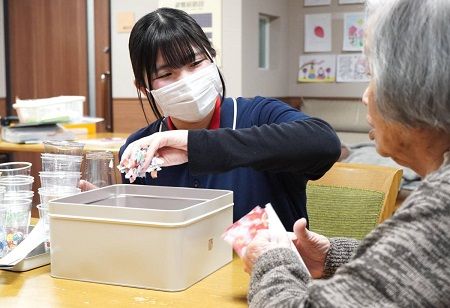-
An apprenticeship system in the nursing care sector with high school students is slowly spreading in Aichi Prefecture, and it is benefiting both students and companies.The system enables apprentices to earn money while learning and gaining expertise from experience under the mentoring of experienced seniors. Through the program, students can learn and work while welfare facilities can cultivate a pool of human resources.
The Aichi Prefecture program is patterned after the United Kingdom's, which are widely regarded as a means through which young people can develop a career. Such schemes have been receiving renewed interest in the U.K. in recent years with increasing university fees, organizers claim. In late February, Soa Ono, a third-year student at Seirei High School in Seto, Aichi Prefecture, was helping an elderly woman as she participated in a recreational activity at a nursing care facility in Nagoya. "Let's do it together a little more," she stated.
Ono, 17, earned an entry-level caregiver's certificate over the summer of her second year of high school. Following an acceptance approval for a university at the close of last year, she started working at the facility twice a week, performing duties like meal distribution.
"I have not yet decided my future career, but I would like to continue this job because I am interested in nursing care", she says. High school students like Ono who work as apprentice workers in welfare facilities are gradually increasing in Aichi Prefecture. The innovative program, known as the Kaitaku Scholarship Program, was initiated in 2022 through collaborative efforts by social welfare corporations and medical facilities in the prefecture.
To acquire the qualification of entry-level caregivers, applicants have to undergo training courses that would typically cost around ¥100,000 ($665). This is too expensive for high school students, but through the Kaitaku program, the welfare facilities finance the training expenses and even give salaries, easing the participation for students. For the nursing care sector, which is facing a long-term shortage of labor, this initiative is a chance to create interest among youth in the profession. Students, on the other hand, can gain from acquiring qualifications and enhancing their competencies at no cost. To date, since the introduction of the program, approximately 50 students have successfully completed their initial training.
Yoshitaka Menjo, head of Nagoya-based group Asubashi, said the program not only enables students to learn skills and knowledge through work, but also enables them to become more independent. Asubashi promotes youth career education and acts as the program's secretariat. Menjo noted that one notable aspect of the program is that it engages students not only from universities, but high schools too.
The initial price of university education in Japan tuition and entrance fees has risen 1.5 times for public universities and 1.4 times for private universities in the last 30 years, the education ministry says. Private universities, especially, have raised fees year after year for facility upgrades and other purposes. "In the midst of rising college costs, high school students can help prep their own funds through this program," Menjo said, stating that the program is intended to be something greater than a part-time job, and involves learning experiences for students.
Under the program, Asubashi conducts monthly workshops for students who have finished their initial training. These workshops consist of seminars on how to enhance communication skills and lectures by entrepreneurs who have established nursing care businesses.
In the U.K., the value of training sessions and seminars beyond the workplace is well understood, states Menjo. "If students do the same work over and over in their workplaces, their development halts", he says. "We seek to encourage ongoing learning throughout the entire program". A lot of students who took part in the program during high school continue to do so even after enrolling in university.
One of them is Kaede Maeda, 19, who is in her first year studying social welfare at Doho University in Nagoya. Through keeping up the job at a nursing care center, she hopes to acquire more experience and ultimately get a national license as a certified caregiver. Maeda mentions that most of the users of the facility suffer from dementia. "I can study many things by working here that I wouldn't comprehend through lessons at school alone", Asubashi's Menjo says that the apprenticeship experience serves to bring high school students to better understand their studies when pursuing higher education. Students who opt to join the job market immediately after high school can also begin their career by using their experiences, he says.
Though the program is only for the moment limited to the nursing care, Menjo said that expansion plans exist to include such apprenticeships in other sectors. Although such initiatives are becoming well known for their educational benefits, Menjo mentioned that some high schools have policies against students engaging in part-time work, which poses a hindrance to such activities. With data available in the public domain, Asubashi analyzed public high school rules in Aichi Prefecture in the 2024 school year.
It discovered that out of 161 full-time public high schools, 70% prohibited part-time work by students in principle, and only around 10% permitted it freely or after notification. In the past, the majority of schools discourage students from taking up part-time work on the grounds that they must focus on their studies unless special reasons require them to do otherwise.School rules have, however, evolved slowly over the last few years.
Among all 66 public high schools of Gifu Prefecture, part-time work is permitted for their students with advance notice. In Mie Prefecture, additional schools are moving away from a policy of permission before a student can take up part-time employment to that of notification. "The apprenticeship schemes are not only a matter of supplying labor", Menjo stated. "With the growing importance of career education, Aichi Prefecture should review how it goes about accepting part-time work from students".
🍪 Do you like Cookies?
We use cookies to ensure you get the best experience on our website. Read more...

